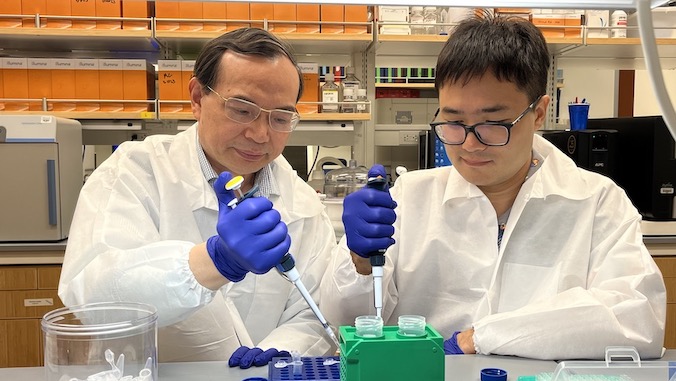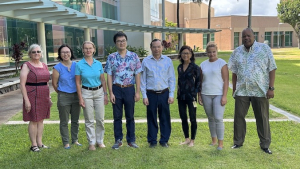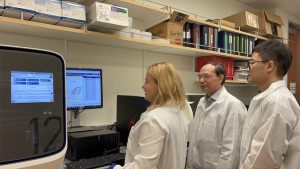
$10.9M to establish UH Pacific Center for Genome Research
University of Hawaiʻi at Mānoa researchers are establishing a genome research center that will focus on Hawaiʻi’s diverse populations with the goal of better understanding the causes of certain diseases, like specific cancer and heart disorders that disproportionately impact different racial and ethnic groups, including Native Hawaiians and Asian Americans.
A $10.9-million grant from the National Institutes of Health (NIH) will help establish the UH Pacific Center for Genome Research (PCGR). It’s part of a nationwide effort to advance diversity in genomics research through innovative, state-of-the-art studies to ultimately improve diagnosis and treatment for minority ethnic groups that have long experienced health disparities.

“There is a strong need for having such a genome research center in Hawaiʻi,” said UH Cancer Center associate professor Lang Wu, the PCGR founding director. “Native Hawaiians and Asian Americans experience disparities across many human diseases compared with other populations. It is known that genomics can contribute to the burden of many of these diseases, so the PCGR will greatly benefit these understudied populations.”
The multi-unit UH team is being led by Wu and UH Mānoa John A. Burns School of Medicine (JABSOM) professor Youping Deng, the PCGR founding co-director. The UH center is one of two full-scale genome research centers at minority serving institutions funded by NIH to serve underrepresented populations.
“Through the generous support of our national and community partners, the PCGR will enable UH researchers to conduct advanced genomic research projects aimed at establishing health equity among the state’s diverse population,” said Vassilis L. Syrmos, UH vice president for research and innovation. “Our new center will not only substantially increase genomic research capacity in the state, but will provide cutting-edge resources, education and training to establish a new genomic workforce in Hawaiʻi.”
Understanding disease genetic factors of diverse populations
” It is known that genomics can contribute to the burden of many diseases, so the PCGR will greatly benefit these understudied populations. “
– Lang Wu
The program has plans for two primary research projects. The first, led by Wu, aims to better understand what causes selected diseases in racially and ethnically diverse populations, including Native Hawaiians, Asians and other populations, using genetic and non-genetic data. The second study, led by Deng, looks to characterize genomic risk factors of lung cancer in Native Hawaiians.
The program’s Community Engagement Core, led by Kevin Cassel, associate professor at UH Cancer Center, and Alika Maunakea, professor at JABSOM, will convene a community advisory board consisting of physicians, content experts and community stakeholders to provide input and oversight for the two research projects. They will develop resources to support genetic education and training for students, medical providers and the broader community.
Training more genomic scientists
In addition to research, the PCGR’s Genomic Workforce Development Core, directed by Jon-Paul Bingham, associate professor at the College of Tropical Agriculture and Human Resources, and Maarit Tiirikainen, associate professor at the UH Cancer Center, will substantially expand the pool of diverse genomic scientists and trainees at UH by providing educational activities and experiences that are aligned with genome research. Through this initiative, it is anticipated that genomic research capacity will be increased, and diversity of the genomics research workforce will be enhanced at all career levels.

“Our long-term goals of fostering excellence in genome research, career development of genomic workforce, and community engagement will lead to sustainable improvements in health and lasting benefits to the people of Hawaiʻi and beyond,” said Wu.
PCGR is supported by NIH’s National Human Genome Research Institute (NHGRI) and National Institute on Minority Health and Health Disparities and is part of NHGRI’s Diversity Center for Genome Research program.
